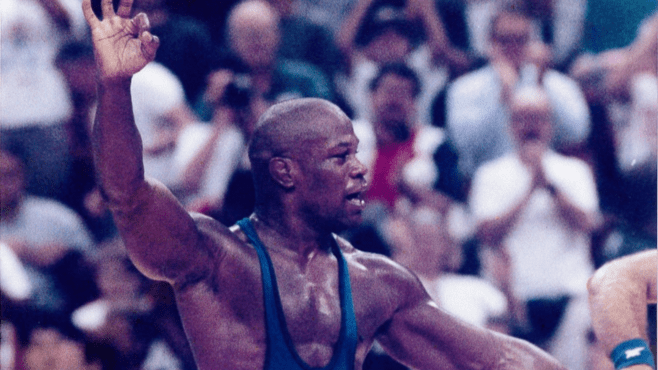
By SHELDON MICKLES
Written for the LSWA
It’s been more than four decades, but former LSU wrestler Lex Roy still remembers a casual conversation he had with one of his younger teammates that still elicits a chuckle.
Kevin Jackson, a two-time Michigan state high school champion who chose LSU over many of the powerhouse programs from the upper Midwest, was engaged in a grueling training session one day when Roy — two years older — spoke up.
“At one point, we’re losing weight and we’re doing all of this crazy stuff,” Roy said. “We called him ‘Jackpot,’ so I looked over at him and said, ‘Listen Jackpot, this wrestling stuff, it doesn’t last forever. You can’t make a living doing it.’
“Well, he proved me wrong,” he said with a laugh. “He’s been wrestling and coaching, and doing all this stuff all his life. And, he’s lived a pretty great life.”
All these years later, Roy has no other choice than to admit he couldn’t have been more wrong about the star wrestler who would become one of his best friends in their two years together at LSU — and still are to this day.
To be sure, Jackson has done it all, starting with the two state titles he claimed at Lansing East High School — which helped make him a blue-chip prospect coveted by just about everyone.
It was just the start of an incredible journey that took him to Louisiana, then all across the world, and now back to his adopted home state where he’ll be inducted into the Louisiana Sports Hall of Fame in Natchitoches on June 22. He is part of the 12-member Class of 2024 to be honored June 20-22 in Natchitoches. For participation opportunities, visit LaSportsHall.com or call 318-238-4255.
Jackson’s list of accomplishments as a competitor, scout and coach on the national and international levels is a lengthy one:
• Junior National Greco-Roman champion
• Four-time All-American (1983-85, 1987)
• Olympic gold medalist (1992)
• World champion (1991, 1995)
• Pan Am Games gold medalist (1991, 1995)
• World Cup gold medalist (1993, 1995, 1997)
• USA Wrestling freestyle coach (2001-08)
• Iowa State head coach (2010-17)
• USA Wrestling freestyle developmental coach (2017-21)
• Michigan assistant coach (2022-present)
The body of work Jackson put together since taking up the sport as a sixth-grader, which he did to follow in the footsteps of an older brother, has gained him a spot in a number of halls of fame.
Tops among them are the National Wrestling Hall of Fame and the United World Wrestling Hall of Fame, as well as the Iowa State and LSU Athletic halls.
But his enshrinement in the Louisiana Sports Hall of Fame is extra special to him.
“Louisiana is like a second home to me,” Jackson said recently. “I chose LSU coming out of high school and I’ve thoroughly enjoyed every aspect of Louisiana — from the music, to the food, to the weather, to the environment, to the swamp — every part of it.
“I really enjoyed my time there. So being inducted into Louisiana’s hall of fame, it’s a little bit more special.”
For those who saw Jackson and competed against him on a daily basis in practice, knew that he was just that — special — when he arrived at LSU in the fall of 1982.
He chose LSU and its up-and-coming program over well-known and successful programs like Iowa, Iowa State and Penn State — with the goal of escaping the frigid north.
“Coming from Michigan, I really wanted warm weather,” Jackson said with a laugh. “Arizona State and LSU were my leading choices, and I had other options as well. But LSU had three guys from Michigan on the team, so I was already acquainted with them.
“Then, the guy that hosted me on my visit turned into my best friend.”
That was Roy, a Michigan transplant from Detroit — about 45 minutes from Lansing.
“Michigan is a great place to grow up,” quipped Roy, a successful business owner who now resides in south Florida. “It’s also a really good place to be from.”
While basking in the warmth of the sunny south, Jackson burst onto the collegiate wrestling scene with an LSU program that had qualified for five consecutive NCAA championship meets from 1978-82.
Wrestling in the 158-pound weight class as a freshman and sophomore, Jackson finished third at the 1983 and ’84 NCAA meets to lead the Tigers to back-to-back eighth-place national finishes — their highest in 11 appearances.
“He was a really good college wrestler,” Roy said. “The higher-level athletes, they have this little something. The little something, always, is they don’t like to lose. So his drive to not lose was pretty phenomenal.”
Mike Millay, an LSU wrestler in the mid- to late-1970s, saw it from afar and then up close when he became a referee in his post-graduate years. He eventually worked some of Jackson’s matches and was obviously impressed.
“I watched him and admired him as a referee,” Millay said. “When he first came to the program, he made everybody else in the room a better wrestler.
“From a wrestling standpoint, it’s really interesting. When you’re rolling around the mat, as we say, you can quickly tell the first skill set and attitudes. He made everybody that much better because he could wrestle with people heavier than him.”
In competition, Millay said Jackson was dominant at his craft.
Obviously, technique and body positioning are key aspects of the sport — things that really stood out early and often to Millay.
“You knew how good he was just by the way he moved on the mat, the way he controlled his body, the way he controlled his opponents,” he said. “Kevin was never out of position. Yeah, I mean, he was a dominant wrestler.”
After moving up to the 167-pound class for his junior season, Jackson finished seventh at the NCAA meet.
While that was a bit of a downer, it was nothing compared to the news that LSU was dropping wrestling in a cost-cutting measure.
Devastated, Jackson and his teammates scattered to other programs around the country and he wound up at Iowa State.
In his lone season there, he was the 167-pound runner-up to Iowa’s Royce Alger at nationals. But Jackson and Iowa State claimed the team title, ending a run of nine consecutive NCAA championships for in-state rival Iowa.
While he didn’t get an individual title, which came after the disappointment of having to leave LSU before his career was finished, he at least had a team championship.
“Kevin was always a big supporter of Louisiana,” Millay said. “He loves LSU and he loves Louisiana. When they dropped the program, he was heartbroken. But he went on to do some great things, for sure.”
Taking his talents to the international stage, Jackson won his first world championship in freestyle at 82kg (181 pounds) in 1991. Later that year, he added the Pan Am Games title to his fast-growing resume.
A year later, he struck gold at the Barcelona Olympics when he defeated Elmadi Zhabrailov of the Soviet Union.
With a gold medal-winning performance at the 1995 World championships, he became one of just six American men to claim at least three career golds at the world level (Olympics/World championships).
Counting his two Pan Am medals in 1991 and ’95, Jackson was one of the USA’s most formidable wrestlers in the early 1990s with five golds in international competition over a five-year span.
“Kevin Jackson was one of the greatest wrestlers our nation has ever produced,” USA
Wrestling national freestyle coach Bill Zadick wrote in support of Jackson’s nomination for the LSU Hall of Fame, which he was inducted into in 2019.
Jackson’s signature move was a “double-leg takedown,” which he said is similar to a defensive back in football bringing down a ball carrier in the open field.
“It’s a form-fitted technique, but it’s a level change,” he explained. “You put your shoulder in his gut, with your hands wrapped around his legs or knees, and you just run through it. I actually won the Olympic Games with a double-leg takedown.”
Jackson had a brief career as a mixed martial arts fighter in the late 1990s, finishing with a 4-2 record, before turning to coaching.
He joined the USA Wrestling coaching staff in 2001 and was freestyle coach for the U.S. at the 2004 and ’08 Olympics when Cael Sanderson (2004) and Henry Cejudo (2008) won gold medals. Jackson also was the primary coach for Brandon Slay, who won Olympic gold in 2000.
With a couple of stints as a USA Wrestling developmental coach behind him, Jackson returned two years ago to the college game as an assistant coach at Michigan.
This weekend, he’s coming full circle from his LSU days — right back where he started in 1982 in a place he unequivocally loves.
“To see the support from the people even after LSU dropped the sport, who have followed me for the rest of my career, is great,” a grateful Jackson said. “When I was inducted into LSU’s hall it was one of the best experiences I have had at any hall of fame, so I feel like this is going to be similar.”
Sheldon Mickles is a Louisiana Sports Hall of Fame inductee as the 2021 recipient of the Distinguished Service Award in Sports Journalism. He covers LSU basketball, track and field and other sports for the Baton Rouge Advocate.

